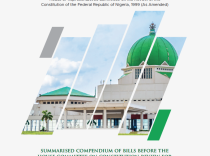On Wednesday 9th November 2016 the Nigerian Customs Service Act (Repeal & Re-enactment) Bill, 2016 scaled second reading in Senate. The bill seeks to establish the Nigeria Customs Service and reform the administration and management of customs and excise in Nigeria. The bill proposes to consolidate enabling laws guiding the operations of the Nigeria Customs Service into a single comprehensive document and repeal the following laws:
- The Customs and Excise Management Act Cap C45, LFN, 2004;
- Customs and Excise Management (Disposal of Goods) Act Cap C46, LFN, 2004;
- Customs and Excise (Special Penal and other Provisions) Act Cap C47 LFN, 2004;
- Customs and Excise Management (Amendment) Act No.20 of 2004;
- Nigeria Customs and Excise Board Act Cap N100 LFN, 2004
- Pre-Shipment Inspection of Export Act, Cap P25, LFN, 2004
- Pre-Shipment Inspection of Import Act, Cap P26, LFN, 2004
- Customs Duties (Dumped and Subsidized Goods) Act, Cap 87, LFN, 2004
Leading the debate on the bill, Sen. Samuel Anyawu (PDP:Imo) stated that the bill was aimed at modernizing the Customs Service as an organization under the supervision of the Ministry of Finance. He noted that the provisions of the Bill aimed at ensuring substantial improvement in the collection of revenue and the facilitation of trade through the installment of the modern payments procedure that provide the option of electronic payment to reduce the possibility of corruption and increase efficiency in the system.
He also mentioned that the Customs and Excise Duties Management Act 2004 does not provide for the establishment of the Nigerian Customs Service and it does not contain provisions to support the use of electronic documents, signatures and electronic payment which have become global best practices, and that these gaps highlighted the need for reform.
Furthermore, he canvassed that the new organizational structure, modern procedures and penalties scheme authorized in the proposed bill would substantially increase government revenue, facilitate improved trade and would be beneficial to the business community.





